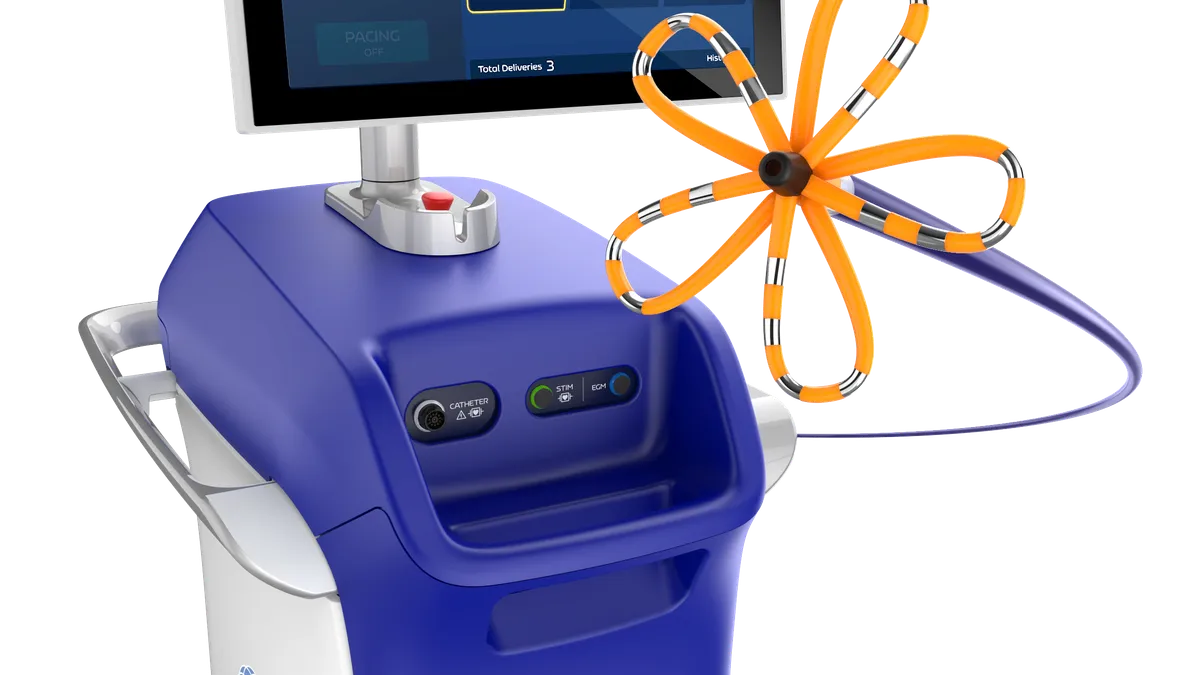Dive Brief:
- Results of a large observational study of Boston Scientific’s Farapulse device found a low rate of adverse events, showing promise for the use of pulsed-field ablation as a treatment for cardiac arrhythmias.
- The study of more than 17,600 patients treated with Farapulse found a rate of major adverse events of less than 1%, including no reports of esophageal fistula, or pulmonary vein stenosis, and low rates of phrenic nerve injury. The results were presented Saturday at the American Heart Association Scientific Sessions.
- “Overall, I think these are very good rates,” said Vivek Reddy, the study’s principal investigator, director of cardiac arrhythmia services at Mount Sinai Hospital, and a paid consultant for Boston Scientific.
Dive Insight:
Boston Scientific has submitted its Farapulse device to the Food and Drug Administration for approval, after sharing results of a pivotal trial earlier this year that found the device was as effective as thermal ablation, the current standard of care.
Farapulse uses electrical pulses to scar heart tissue and treat atrial fibrillation. Analysts expect the technology to have a better safety profile than current technologies that use heat or cold to scar tissue, leading them to believe it will be adopted when it is available in the U.S.
“It’s likely that U.S. uptake will be very quick,” Reddy said, noting that in Europe some centers have switched to doing all procedures using pulsed-field ablation, depending on reimbursement, as the technology is more expensive than conventional catheters.
The goal of the MANIFEST-17K study was to see if the safety findings from a smaller cohort of more than 1,700 patients held up across more than 17,000 patients. Researchers received data from 106 centers in Europe, where Farapulse is CE marked, from patients treated with the device.
A total of 173 major adverse events were reported, for a rate of 0.98%. There were no reports of esophageal fistula, a serious complication caused by injury to the esophagus during thermal ablation. There were also no reports of pulmonary vein stenosis, where the veins that carry blood from the lungs to the heart are narrowed.
The most common major adverse events were pericardial tamponade, a condition where fluid accumulates in the sac around the heart, with 63 reported events, and vascular complications, with 53 events.
Five patients also experienced renal failure, a complication that hadn’t been reported in the previous registry studies. Reddy said the complications were found in patients who received a lot of lesions, nearly double the average of 50 to 80 lesions. These patients needed hemodialysis and an extended hospital stay, but ultimately recovered.
A total of five deaths were reported in the analysis, with two directly related to the procedure.
It’s difficult to compare the results apples-to-apples with other cardiac ablation technologies. Reddy said comparisons between a large registry study and a clinical trial where patients are selected might not be fair.
“If you look at when those technologies got introduced, these rates compare quite favorably,” Reddy said. “If you look at what the complication rates are now, it’s a little bit tricky.”
Going forward, Reddy is watching for more data on the effectiveness of pulsed-field ablation compared to other modalities. There’s currently little data on the long-term effectiveness of the treatment.
He also noted that the results of this analysis might not necessarily translate to other pulsed-field ablation technologies, which use different waveforms. Medtronic and Johnson & Johnson are also working to bring their own pulsed-field ablation technologies to the U.S.











